- Home
- Jhumpa Lahiri
The Penguin Book of Italian Short Stories Page 9
The Penguin Book of Italian Short Stories Read online
Page 9
How could I not get angry? I had been forced to endure a wretched period of life. Frightened and impoverished, I had let any generous instinct of mine die out to make room for pills, drops and powders. No more Socialism. What could it matter to me if the world, contrary to all of the most scientific conclusions, remained under private ownership? If many people, for that reason, were not allowed their daily bread or the portion of freedom that should adorn man’s every day? Did I perhaps have either?
I tried to become my essential self that blessed evening. When, in his stentorian voice, my nephew Giovanni, a gigantic man who weighs more than two hundred pounds, started telling a few stories about his own cunning and other people’s credulity in business, I found the old altruism in my heart again.
‘What will you do,’ I shouted at him, ‘when the struggle is no longer a struggle over money?’
For a second, Giovanni was stunned by my dense phrase, which happened to shake his world. He stared at me with his eyes made bigger by his glasses. He was examining my face for explanations by which to get oriented. Then, while everybody was looking at him, hoping to be able to laugh at one of the retorts of that ignorant and intelligent oaf, at his ingenuous and malicious wit, which is always surprising despite having been used even before Sancho Panza, he stalled for time by saying that for everyone else wine altered the view of the present, whereas for me it muddled the future. That wasn’t bad, but then he thought he had come up with something better and shouted:
‘When no one fights over money any more, I’ll have it all to myself, without a fight, all of it, all of it.’
He laughed a lot, in particular at a repeated movement of his big arms, which at first he held out all the way and then drew towards him with his fists closed to suggest that he had grabbed the money that was supposed to flow towards him from all sides.
The discussion went on, and no one noticed that when I wasn’t talking I was drinking. And I drank a lot and said little, intent as I was on studying my core, to see if it was finally going to fill with benevolence and altruism. That core was burning slightly. But it was a burning that would later turn into a pleasant, diffuse warmth, into the feeling of youthfulness provided – but briefly, alas – by wine.
And, expecting this, I shouted at Giovanni:
‘If you take the money others refuse, they’ll throw you in the clink.’
But Giovanni quickly shouted:
‘And I will bribe the jailers and have those who don’t have the money to bribe them locked up.’
‘But money will no longer corrupt anyone.’
‘Then why not let me keep it?’
I got immoderately angry:
‘We’ll hang you,’ I yelled. ‘It’s what you deserve. A noose around your neck and weights on your legs.’
I stopped in astonishment. I had the impression I hadn’t said exactly what I was thinking. Was that really how I was? No, of course not. I reflected: how to recover my fondness for all living creatures, of which Giovanni was surely one? I immediately gave him a smile, making a huge effort to mend my ways and to excuse him and love him. But he kept me from doing so, as he paid my benevolent smile no heed whatsoever and, as if resigning himself to the observation of a monstrosity, said:
‘Well, in practice, all Socialists end up resorting to the hangman.’
He had defeated me, but I hated him. He perverted my entire life, even the part of it preceding the doctor’s intervention, a part I looked back on as highly luminous. He had defeated me because he had revealed the very doubt that had assailed me terribly even before his words.
Another punishment awaited me immediately thereafter.
‘He looks well,’ my sister had said, looking at me with satisfaction, and it was an infelicitous phrase, because my wife, as soon as she heard it, foresaw the possibility that the excessive wellbeing that was colouring my face would degenerate into a proportionally great illness. She was as frightened as if she had been warned of imminent danger just then and turned fiercely on me:
‘Enough, enough!’ she shouted. ‘Put that glass away.’
She appealed for help from the man next to me, one Alberi, who, slender, dry and healthy but, like Giovanni, bespectacled, was one of the tallest men in the city.
‘Be so kind as to take that glass from his hand.’
And since Alberi hesitated, she got emotional, agitated:
‘Signor Alberi, please. Take that glass from him.’
I wanted to laugh; that is, I sensed that a well-mannered person would do well to laugh then, but it was impossible for me. I had readied my rebellion for the next day and it wasn’t my fault if it broke out right away. Those public rebukes were really insulting. Alberi, who didn’t give a fig for me, my wife and all those people who were giving him food and drink, aggravated my situation, making it ridiculous. He looked over his glasses at the glass I had in my grip, moved his hands over as if he were going to take it from me, and ended up pulling them back with a quick jerk, as if he were afraid of me for looking at him. Everybody was laughing at me behind my back, Giovanni with a shouted laugh of his that caused him to get out of breath.
My daughter Emma thought her mother needed her help. With a tone that struck me as excessively imploring, she said:
‘Papà, stop drinking.’
And it was on that innocent creature that I poured my wrath. I said to her a harsh and threatening word dictated by an old man’s and a father’s resentment. Her eyes immediately filled with tears, and her mother stopped concerning herself with me to concentrate entirely on comforting her.
My son Ottavio, thirteen years old then, came running to his mother just then. He hadn’t noticed anything, either his sister’s distress or the dispute that had caused it. He wanted permission to go to the movies the following evening with a few friends of his who had suggested it to him just then. But my wife, completely given over to her position as Emma’s consoler, wasn’t listening to him.
‘Yes,’ I shouted, trying to assert myself with an act of authority, ‘of course you can go to the movies.’
Ottavio, not hearing anything else, went back to his friends after having told me:
‘Thank you, Papà.’
A pity, that haste of his. If he had stayed with us, his happiness, the product of my act of authority, would have raised my spirits.
The good mood at the table was wrecked for a minute or two, and I sensed that I had wronged the bride, for whom that good mood was meant to be a good omen and a sign of things to come. And yet it was she alone, or so it seemed to me, who understood my distress. She was looking at me downright maternally, willing to excuse me and flatter me. That girl had always had that look of certainty in her judgements.
As when she was aspiring to a cloistered life, she thought now she was better than everyone else for having renounced it. Now she was prevailing upon me, upon my wife and upon my daughter. She felt sorry for us, and her lovely grey eyes fell on us, serenely, to look for the flaw that, in her view, had to be present wherever there was distress.
That heightened my resentment of my wife, whose behaviour was humiliating us. It made us inferior to everybody else at the table, even the most wretched figures. Down at the far end, even my sister-in-law’s children had stopped chatting and had brought their little heads together to talk about what had just happened. I clutched my glass, unsure whether to drain it or to hurl it at the wall or even at the facing windowpanes. I ended up draining it in one go. That, a declaration of independence, was my most energetic act: it seemed to me the best wine I had had that evening. I lengthened the act by pouring myself more wine, which I also sipped a bit of, into the glass. But joy wasn’t forthcoming, and all the overly intense energy that was enlivening my body was rancour. An odd idea came to me. Not everything was clarified by my rebellion. Could I not also ask the bride to rebel with me? Fortunately, she smiled gently just then at the trusting man by her side. And I thought: ‘She doesn’t know yet, and she is convinced she does.’
> I remember, too, that Giovanni said:
‘But let him drink. Wine is old men’s milk.’
I gave him a look, wrinkling my face up to feign a smile, but I couldn’t find it in me to wish him well. I knew that he was concerned only about the good-mood atmosphere and that he wanted to content me, the way one does an excited child who is disturbing a gathering of adults.
Then I drank little and only if people were looking at me, and not a word more did I say. All around me was cheerful shouting, and it bothered me. I wasn’t listening, but it was hard not to hear. An argument between Alberi and Giovanni had broken out, and everybody was having fun watching the fat man contend with the thin man. What the argument was about I don’t know, but I heard fairly aggressive words coming from both of them. I saw Alberi, who, standing up, stretched out toward Giovanni, was putting his glasses almost in the middle of the table, very near his adversary, who had comfortably laid his 260 pounds in a deckchair offered him as a joke at the end of the dinner, and was studying him intently, like the good fencer he was, as if he were weighing where to aim his own thrust. But Alberi was fine too, so very lean, though still healthy, mobile and serene.
And I remember, too, the good wishes and the endless farewells as we took leave of each other. The bride gave me a kiss with a smile that seemed maternal to me again. I took that kiss absent-mindedly. I was thinking about when I would be given leave to explain to her a thing or two about this life.
Just then a name was mentioned by someone, that of a friend of my wife and old friend of mine: Anna. By whom or for what reason I don’t know, but it was the last name I heard before being left in peace by the dinner guests. For years I had been seeing her with my wife and greeting her with the friendliness and indifference of people who have no reason to complain about having been born in the same city and at the same time. But now I was remembering that, years earlier, she had been my sole offence. I had wooed her almost up to the moment I had married my wife. But no one had ever spoken of my act of betrayal, which had been so sudden I hadn’t even tried to cushion it with a single word, because shortly thereafter she, too, had gotten married and been very happy. She hadn’t taken part in our dinner because she was in bed with a light bout of the flu. Nothing serious. What was odd and serious was that I should remember my offence, which came now to weigh on my already troubled conscience. I had the feeling I was being punished for my old offence just then. From her bed, in which she was probably convalescing, I could hear my victim protest: ‘It wouldn’t be fair if you were to be happy.’ I went off to my bedroom in very low spirits. I was a bit confused, because the fact is it didn’t seem right to me that my wife should have been entrusted with avenging the person whose place she herself had taken.
Emma came to wish me goodnight. She was smiling, rosy, fresh. Her brief fit of tears had given way to a reaction of joy, as happens in all young and healthy bodies. I had been reading other people’s states of mind well for a little while, and, besides, my daughter was clear water. My outburst of anger had conferred importance on her in front of everybody, and she was savouring it with complete naivety. I gave her a kiss and am sure I thought it was lucky for me that she was so happy and pleased. To bring her up, to be sure, it would have been my duty to warn her that she had not shown me sufficient respect. She left, and nothing remained of my attempt to come up with those words but a worry, a vagueness, an effort that stayed with me for some time. To calm down, I thought: ‘I’ll talk to her tomorrow. I’ll tell her my reasons.’ But it did no good. I had offended her, and she had offended me. And I was offended again that she should no longer be thinking about it, whereas I still was.
Ottavio came to say goodnight to me as well. An odd kid. He said goodnight to me and to his mother almost without seeing us. He had already left when I reached him with my shout:
‘Glad to be going to the movies?’
He stopped, made an effort to remember, and, before resuming his flight, said drily:
‘Yes.’
He was very sleepy.
My wife handed me the pillbox.
‘These are the ones?’ I asked, a chilly mask on my face.
‘Yes, of course,’ she said nicely.
She examined me and, not knowing how to read me otherwise, asked me hesitantly:
‘Are you feeling all right?’
‘Perfectly fine,’ I said resolutely, taking off a boot.
And at that very instant my stomach started burning frightfully. This was what she wanted, I thought, with a logic I doubt only now.
I took the pill with a sip of water and got a bit of relief from it. I kissed my wife on the cheek mechanically. It was a kiss such as could accompany the pills. I couldn’t avoid it if I wanted to spare myself arguments and explanations. But I was unable to retire for the night without spelling out my position in the fight that, for me, had still not ended, and as I settled into bed I said: ‘I think the pills would work better taken with wine.’
She turned off the light, and very soon the regularity of her breathing told me her conscience was clear; that is, I immediately thought, the uttermost indifference to anything that had to do with me. I had been awaiting that instant eagerly, and immediately I told myself I was finally free to breathe noisily, as it seemed to me the state of my body required, or even to sob, as I would have liked to in my despondency. But the anxiety, as soon as it was free, became an even more real anxiety. This was certainly not liberty. How to give vent to the anger raging in me? I could do nothing other than turn over in my mind what I would say to my wife and daughter the next day. ‘Are you really so concerned about my health, when you annoy me in front of everybody?’ It was absolutely true. And here I was, alone, racking my brains in bed, and they were sleeping peacefully. What a burning sensation! A large expanse that was flowing into my throat had overrun my body. The bottle of water had to be on the night table by the bed, and I put my hand out for it. But I hit the empty glass, and it took only the light clink to wake up my wife. As it is, she always sleeps with one eye open.
‘Are you feeling bad?’ she asked me in a whisper.
She wasn’t sure she had heard and didn’t want to wake me up. I speculated a bit, but I attributed to her the odd intention of rejoicing in that suffering of mine, which was none other than proof that she had been right. I did without the water and lay back down very quietly. She immediately fell back into that light slumber of hers that enabled her to keep an eye on me.
In short, if I didn’t want to put up with that fight with my wife, I was going to have to sleep. I closed my eyes and curled up on one side. Right away, I had to change position. But I was determined and didn’t open my eyes. But every position sacrificed a part of my body. With a body made this way, I thought, there won’t be any sleeping. I was all movement, all wakefulness. A person who is running cannot imagine sleep. I was out of breath, as if from running, and in my ears was the pounding of my feet: of heavy boots. I thought I was perhaps moving too gently in bed to be able to get into the right position and with all of my limbs all at once. Better not to seek it. Better to let everything find the spot that suited its form. I turned over with complete violence. ‘Are you OK?’ my wife immediately muttered. But I didn’t want to respond to those words that alluded offensively to our argument.
Keeping still had to be really easy. What could be so hard about lying, really lying, in bed? I reviewed all of the great difficulties we bump into in this world and found that, by comparison, lying without moving was a trifle. Every swine is able to keep still. My determination came up with a complicated but unbelievably tenacious position. I put my teeth in the upper part of the pillow and twisted around in such a way that my chest was resting on the pillow too, while my right leg hung off the bed and was nearly touching the floor and my left leg went stiff in the bed, chaining me to it. Yes. I had discovered a new system. I wasn’t clinging to the bed; it was the bed that was clinging to me. And this firm belief in my inertia meant that even when my feeling of oppr
ession increased I didn’t give in. When, later, I did have to yield, I consoled myself with the thought that a part of that horrendous night had gone by, and I also had the recompense that, freed from the bed, I felt relieved like a wrestler who has freed himself from his rival’s hold.
I don’t know how long I stayed still for then. I was tired. Surprised, I noticed a strange glow in my closed eyes, a whirling of flames I imagined caused by the fire I felt in me. They weren’t real flames, but colours that simulated them. And then they died out, little by little, and became roundish forms, which soon went all blue, soft, but ringed by a bright red band. They were falling from a high spot, lengthening, and, once they dropped off, disappearing below. It was I who first thought those drops could see me. At once, to see me better, they turned into a lot of little eyes. As they lengthened, falling, a small circle formed in their centre, a circle that, doing without the blue layer, revealed a real eye, malicious and malevolent. I was being chased by a throng that wished me ill. I rebelled in bed, moaning and crying out: ‘My God!’
‘Are you feeling bad?’ my wife immediately asked.
Some time must have gone by before the response. But then I happened to notice that I was now clinging to the bed, not lying in it, and that it had become a steep slope I was sliding down.
‘I feel bad,’ I shouted, ‘very bad.’
My wife had lit a candle and was by my side in her pinkish nightgown. The light reassured me and in fact I had the clear feeling of having slept and of having awoken only then. The bed had straightened back out, and I was lying effortlessly in it. I looked at my wife in surprise, because now, since I had realized I had slept, I was no longer sure of having called for her help.
‘What do you want?’ I asked.
Sleepy, fatigued, she looked at me. My cry had been enough to have her leap out of bed, not to take from her desire for rest, next to which not even being right mattered to her any longer.

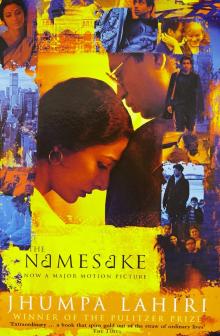 The Namesake
The Namesake Nobody's Business
Nobody's Business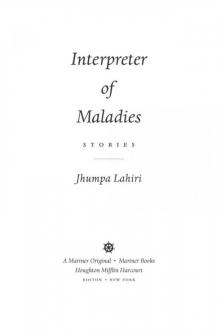 Interpreter of Maladies
Interpreter of Maladies Hell-Heaven
Hell-Heaven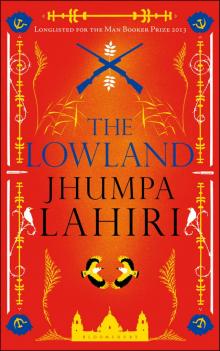 The Lowland
The Lowland Unaccustomed Earth
Unaccustomed Earth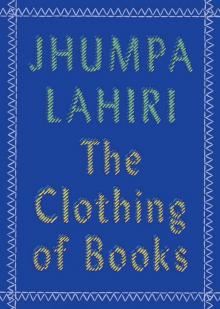 The Clothing of Books
The Clothing of Books In Other Words
In Other Words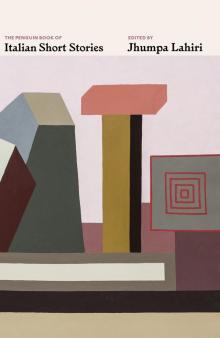 The Penguin Book of Italian Short Stories
The Penguin Book of Italian Short Stories